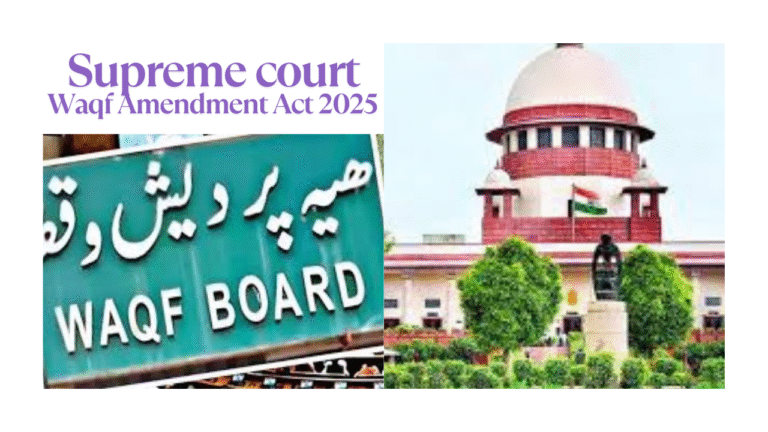
The Waqf Amendment Act has become a hot topic in India’s legal and social discourse.
With mounting public interest and multiple petitions challenging the legislation, the Supreme Court has now taken center stage in addressing the concerns surrounding this controversial law.
Background of the Waqf Amendment Act
The Waqf Amendment Act is a law that governs religious endowments in India, especially within the Muslim community. It empowers Waqf Boards to oversee, manage, and protect properties registered under this category. However, recent amendments to this Act have stirred strong opposition, prompting legal challenges and widespread debate.
Legal and Public Attention on the Issue
Critics argue that the new amendments grant disproportionate power to Waqf Boards, potentially leading to wrongful claims on private and village lands. The growing number of petitions reflects public unease, and the matter has reached the Supreme Court for constitutional scrutiny.
The Supreme Court’s Recent Intervention
Petitions Filed Against the Waqf Amendment Act
Multiple public interest litigations have been filed against the Waqf Amendment Act. These petitions primarily focus on clauses that could affect land ownership, administrative appointments, and the legal rights of individuals.
Bench Led by Chief Justice in Focus
A bench led by the Chief Justice of India (CJI) is currently hearing the matter. With national implications, every statement and directive from the bench is being closely watched.
Key Highlights from the Courtroom Proceedings
Day 1 – Initial Hearing and Arguments Begin
On Thursday, the Supreme Court officially began hearing the petitions. The arguments laid the groundwork for what is likely to be a long and complex legal battle.
SG Tushar Mehta Represents the Central Government
Representing the Centre, Solicitor General Tushar Mehta addressed the bench with a strong defense of the amendments.
Plea Against Partial Interpretation
SG Mehta urged the bench not to rely on selected sections of the law. He emphasized the importance of considering the Act as a whole, given the numerous amendments and administrative changes introduced.
Impact on Personal and Community Properties
He highlighted that many village lands and private properties had been wrongly recorded as Waqf assets, and any stay—even partial—could have serious implications on the ground.
Chief Justice‘s Key Observations
Clarifications on Stay Orders
In response, the CJI made it clear that the court did not wish to cause any disruption. He clarified that provisions which are already in effect for five years will not be stayed for now.
Court’s Refusal to Stay the Act Entirely
Despite the concerns raised, the Supreme Court has not stayed the Waqf Amendment Act. Instead, it is proceeding with caution, issuing limited interim directions without halting the law in its entirety.
The Central Government’s Stand
Argument for Delay in Interim Decisions
SG Mehta requested the court to defer any immediate interim orders. He suggested that a week’s time would allow the government to present additional documentation and a more detailed argument.
Request to Submit Further Documents
He also sought permission to submit relevant documents to better illustrate the government’s position regarding the amendments.
Assurance of No Change in a Week
To support his plea, SG Mehta assured the court that no major developments would occur within a week, implying that the legal situation would remain unchanged.
The Supreme Court’s Interim Decision

No Appointments to Be Made Until Next Hearing
Accepting the Solicitor General’s suggestion in part, the Supreme Court ruled that no new appointments to the Waqf Board should be made until the next hearing.
Legal Status of Current and Future Appointments
The CJI also clarified that any appointments made during this period would not be legally valid, reinforcing the seriousness of the interim directions.
Preservation of Waqf Property Status Quo
Further, the court ordered that no changes should be made to Waqf property records or ownership statuses during this interim period.
Legal Significance of the Interim Order
What It Means for the Petitioners
The decision not to grant a complete stay, but still freeze appointments and property changes, reflects a careful balancing act by the court—protecting both constitutional principles and public interests.
Implications for State Governments and Waqf Boards
State authorities and Waqf Boards are now bound by the interim order. Any changes made in violation of this order could be struck down in future hearings.
Reactions and Expert Opinions
Legal Analysts Weigh In
Many legal experts have applauded the court’s cautious approach, highlighting its attempt to prevent misuse of the law while still respecting legislative authority.
Public Concerns Regarding Land Ownership
From local landowners to community leaders, many have voiced concerns about wrongful categorization of lands under Waqf properties. These voices continue to add pressure on both the judiciary and the government.
What Happens Next?
One Week Timeline for Central Government’s Response
The Supreme Court has given the Centre one week to file a comprehensive counter, outlining its legal position on all issues raised by the petitioners.
Future Hearings and Possible Outcomes
The upcoming hearings on Waqf Amendment will determine whether more stringent measures will be introduced. It’s a legal tug-of-war that could reshape how religious endowments are managed in India.
Understanding the Waqf Amendment Act
What is Waqf?
Waqf refers to a religious endowment in Islam, typically involving properties donated for charitable or religious purposes. These are managed by Waqf Boards.
Key Provisions in the Controversial Amendment
The amendments introduced new powers for Waqf Boards, streamlined the appointment processes, and allowed more centralized control—raising red flags for many stakeholders.
Why is It Being Challenged?
Petitioners argue that the Waqf Amendment Act violates fundamental rights, lacks checks and balances, and could lead to unauthorized claims over private lands.
Conclusion
The Supreme Court’s decision to step in and monitor the implementation of the Waqf Amendment Act signals the seriousness of the issue. With legal complexities and socio-political sensitivities deeply entwined, this is more than just a courtroom battle—it’s a debate about land, faith, and governance in a diverse nation. As the hearing continues, all eyes are on the apex court’s next move.